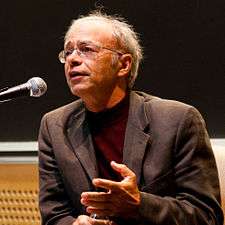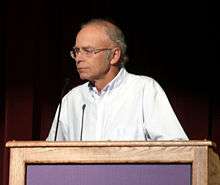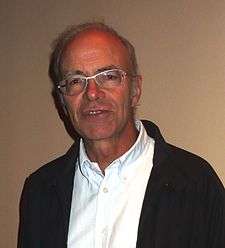
If evolution is a struggle for survival, why hasn't it ruthlessly eliminated altruists, who seem to increase another's prospects of survival at the cost of their own?

The perspective on ourselves that we get when we take the point of view of the universe also yields as much objectivity as we need if we are to find a cause that is worthwhile in a way that is independent of our own desires.
Peter Albert David Singer (born 6 July 1946 in Melbourne, Victoria, Australia) is an Australian philosopher. He is the Ira W. DeCamp Professor of Bioethics at Princeton University and laureate professor at the Centre for Applied Philosophy and Public Ethics (CAPPE), University of Melbourne. He specializes in practical ethics, approaching ethical issues from a preference utilitarianism and atheistic perspective.
Quotes
- When we buy new clothes not to keep ourselves warm but to look "well-dressed" we are not providing for any important need. We would not be sacrificing anything significant if we were to continue to wear our old clothes, and give the money to famine relief. By doing so, we would be preventing another person from starving. It follows from what I have said earlier that we ought to give money away, rather than spend it on clothes which we do not need to keep us warm. To do so is not charitable, or generous. Nor is it the kind of act which philosophers and theologians have called "supererogatory" - an act which it would be good to do, but not wrong not to do. On the contrary, we ought to give the money away, and it is wrong not to do so.
- To be honest, I was somewhat disappointed... It's had effects around the margins, of course, but they have mostly been minor. When I wrote it, I really thought the book would change the world. I know it sounds a little grand now, but at the time the sixties still existed for us. It looked as if real changes were possible, and I let myself believe that this would be one of them. All you have to do is walk around the corner to McDonald's to see how successful I have been.
- Quoted by Michael Specter on the impact of the book Animal Liberation, "The Dangerous Philosopher", The New Yorker, 6 September 1999.
- Speciesism is an attitude of prejudice towards beings because they're not members of our species, so just as racism means that you're prejudiced against beings who are not members of your race and sexism means you're prejudiced against people of the other sex. So we humans tend to be speciesist in we think that any being that is a member of the species homo sapien just automatically has a higher moral status and is more important than any being that is a member of any other species, irrespective of the actual characteristics of those beings.
- Philosophy is not politics, and we do our best, within our all-too-human limitations, to seek the truth, not to score points against opponents. There is little satisfaction in gaining an easy triumph over a weak opponent while ignoring better arguments against your views.
- 'Last Generation': A Response, New York Times, June 16, 2010.
- There may have been times when I wondered if there might be a God, but it always seemed to me wildly implausible that a God worth worshipping could allow the Holocaust to occur.
- Interview with the Jewish Chronicle, Dan Goldberg, 16 August, 2012.
Animal Liberation: A New Ethics for our Treatment of Animals (1975)
- Animal Liberation, Random House, 2015. ISBN 9781473524422
- Animal Liberation is Human Liberation too.
- Preface
- Speciesism—the word is not an attractive one, but I can think of no better term—is a prejudice or attitude of bias in favor of the interests of members of one's own species and against those of members of other species.
- Ch. 1: All Animals Are Equal
- Let us consider first the view that it is always wrong to take an innocent human life. We may call this the “sanctity of life” view. People who take this view oppose abortion and euthanasia. They do not usually, however, oppose the killing of nonhuman animals—so perhaps it would be more accurate to describe this view as the “sanctity of human life” view. The belief that human life, and only human life, is sacrosanct is a form of speciesism.
- Ch. 1: All Animals Are Equal
- [One thing] underpins, makes consistent, and gives meaning to all our other activities on behalf of animals. This one thing is that we take responsibility for our own lives, and make them as free of cruelty as we can. The first step is that we cease to eat animals. Many people who are opposed to cruelty to animals draw the line at becoming a vegetarian. It was of such people that Oliver Goldsmith, the eighteenth-century humanitarian essayist, wrote: "They pity, and they eat the objects of their compassion."
- Ch. 4: Becoming a Vegetarian
- Becoming a vegetarian is not merely a symbolic gesture. Nor is it an attempt to isolate oneself from the ugly realities of the world, to keep oneself pure and so without responsibility for the cruelty and carnage all around. Becoming a vegetarian is a highly practical and effective step one can take toward ending both the killing of nonhuman animals and the infliction of suffering upon them.
- Ch. 4: Becoming a Vegetarian
- To protest about bullfighting in Spain, the eating of dogs in South Korea, or the slaughter of baby seals in Canada while continuing to eat eggs from hens who have spent their lives crammed into cages, or veal from calves who have been deprived of their mothers, their proper diet, and the freedom to lie down with their legs extended, is like denouncing apartheid in South Africa while asking your neighbors not to sell their houses to blacks.
- Ch. 4: Becoming a Vegetarian
- How far down the evolutionary scale shall we go? Shall we eat fish? What about shrimps? Oysters? To answer these questions we must bear in mind the central principle on which our concern for other beings is based. As I said … the only legitimate boundary to our concern for the interests of other beings is the point at which it is no longer accurate to say that the other being has interests. To have interests, in a strict, nonmetaphorical sense, a being must be capable of suffering or experiencing pleasure. If a being suffers, there can be no moral justification for disregarding that suffering, or for refusing to count it equally with the like suffering of any other being. But the converse of this is also true. If a being is not capable of suffering, or of enjoyment, there is nothing to take into account.
- Ch. 4: Becoming a Vegetarian
- Those who claim to care about the wellbeing of human beings and the preservation of our environment should become vegetarians for that reason alone. They would thereby increase the amount of grain available to feed people elsewhere, reduce pollution, save water and energy, and cease contributing to the clearing of forests; moreover, since a vegetarian diet is cheaper than one based on meat dishes, they would have more money available to devote to famine relief, population control, or whatever social or political cause they thought most urgent. … when nonvegetarians say that “human problems come first” I cannot help wondering what exactly it is that they are doing for human beings that compels them to continue to support the wasteful, ruthless exploitation of farm animals.
- Ch. 6: Speciesism Today
- The animals themselves are incapable of demanding their own liberation, or of protesting against their condition with votes, demonstrations, or boycotts. Human beings have the power to continue to oppress other species forever, or until we make this planet unsuitable for living beings. Will our tyranny continue, proving that morality counts for nothing when it clashes with selfinterest, as the most cynical of poets and philosophers have always said? Or will we rise to the challenge and prove our capacity for genuine altruism by ending our ruthless exploitation of the species in our power, not because we are forced to do so by rebels or terrorists, but because we recognize that our position is morally indefensible? The way in which we answer this question depends on the way in which each one of us, individually, answers it.
- Ch. 6: Speciesism Today
The Expanding Circle: Ethics, Evolution, and Moral Progress (1981)
- It is now generally accepted that the roots of our ethics lie in patterns of behavior that evolved among our pre-human ancestors, the social mammals and that we retain within our biological nature elements of these evolved responses. We have learned considerably more about these responses, and we are beginning to to understand how they interact with our capacity to reason.
- Preface To The 2011 edition, p. xi
- Ethics is inescapable.
- Preface, p. xv
- Human beings are social animals. We were social before we were human.
- Chapter 1, The Origins Of Altruism, p. 3
- If evolution is a struggle for survival, why hasn't it ruthlessly eliminated altruists, who seem to increase another's prospects of survival at the cost of their own?
- Chapter 1, The Origins Of Altruism, p. 5
- The core of ethics runs deep in our species and is common to human beings everywhere. It survives the most appalling hardships and the most ruthless attempts to deprive human beings of their humanity. Nevertheless, some people resist the idea that his core has a biological basis which we have inherited from our pre-human ancestors.
- Chapter 2, The Biological Basis Of Ethics, p. 27
- Herbert Spencer is little read now. Philosophers do not regard him as a major thinker. Social Darwinism has long been in disrepute.
- Chapter 3, From Evolution To Ethics?, p. 61
- Everyday we act in ways that reflect our ethical judgements.
- Chapter 3, From Evolution To Ethics?, p. 69
- The capacity to reason is a special sort of capacity because it can lead us to places that we did not expect to go.
- Chapter 4, Reason, p. 88
- Beginning to reason is like stepping onto an escalator that leads upward and out of sight. Once we take the first step, the distance to be traveled is independent of our will and we cannot know in advance where we shall end.
- Chapter 4, Reason, p. 88
- There can be no brotherhood when some nations indulge in previously unheard of luxuries, while others struggle to stave off famine.
- Chapter 4, Reason, p. 119
- The only justifiable stopping place for for the expansion of altruism is the point at which all whose welfare can be affected by our actions are included within the circle of altruism. This means that all beings with the capacity to feel pleasure or pain should be included; we can improve their welfare by increasing their pleasures and diminishing their pains.
- Chapter 4, Reason, p. 120
- Since ancient times, philosophers have maintained that to strive too hard for one's own happiness is self-defeating.
- Chapter 5, Reason And Genes, p. 145
- The principles of ethics come from our own nature as social, reasoning beings.
- Chapter 6, A New Understanding Of Ethics, p. 149
- The goal of maximizing the welfare of all may be better achieved by an ethic that accepts our inclinations and harnesses them so that, taken as a whole, the system works to everyone's advantage.
- Chapter 6, A New Understanding Of Ethics, p. 157
- Ethics seems a morass which we have to cross, but get hopelessly bogged in when we make the attempt.
- Chapter 6, A New Understanding Of Ethics, p. 167
- Human social institutions can effect the course of human evolution. Just as climate, food supply, predators, and other natural forces of selection have molded our nature, so too can our culture.
- Chapter 6, A New Understanding Of Ethics, p. 172

Peter Singer
Science does not stand still, and neither does philosophy, although the latter has a tendency to walk in circles.
Science does not stand still, and neither does philosophy, although the latter has a tendency to walk in circles.
- Science does not stand still, and neither does philosophy, although the latter has a tendency to walk in circles.
- Afterword To The 2011 Edition, p. 187
Writings on an Ethical Life (2000)
Eco Press, 2000, ISBN 0-06-0-19838-9
- We are responsible not only for what we do but also for what we could have prevented.
- Introduction (p. xv)
- When my ability to reason shows me that the suffering of another being is very similar to my own suffering and matters just as much to that other being as my own suffering matters to me, then my reason is showing me something that is undeniably true. ... The perspective on ourselves that we get when we take the point of view of the universe also yields as much objectivity as we need if we are to find a cause that is worthwhile in a way that is independent of our own desires. The most obvious such cause is the reduction of pain and suffering, wherever it is to be found.
Practical Ethics, 3rd Edition (2011)
Cambridge University Press, 2011, ISBN 0521707684
- It is easy for us to criticize the prejudices of our grandfathers, from which our fathers freed themselves. It is more difficult to search for prejudices among the beliefs and values that we hold.
- Ch. 3: Equality for Animals? (p. 49)
One World Now: The Ethics of Globalization (2016)
Yale University Press, 2016, ISBN 978-0300196054
- September 11, 2001, was just another day for most of the world’s desperately poor people, so presumably close to 30,000 children under five died from these causes on that day—about ten times the number of victims of the terrorist attacks. The publication of these figures did not lead to an avalanche of money for UNICEF or other aid agencies helping to reduce infant mortality. In the year 2000 Americans made private donations for foreign aid of all kinds totaling about $4 per person in extreme poverty, or roughly $20 per family. New Yorkers who were living in lower Manhattan on September 11, 2001, whether wealthy or not, were able to receive an average of $5,300 per family. The distance between these amounts encapsulates the way in which, for many people, the circle of concern for others stops at the boundaries of their own country—if it extends even that far.
- Chapter 5: One Community (p. 176)
Quotes about Singer
- Some of Singer's critics call him a Nazi and compare his proposals to Hitler's schemes for eliminating the unwanted, the unfit and the disabled. But … Singer is no Hitler. He doesn't want state-sponsored killings. Rather, he wants the decision to kill to be made by you and me. Instead of government-conducted genocide, Singer favors free-market homicide.
- At one level, this movement on behalf of oppressed farm animals is emotional … Yet the movement is also the product of a deep intellectual ferment pioneered by the Princeton scholar Peter Singer. … This idea popularized by Professor Singer — that we have ethical obligations that transcend our species — is one whose time appears to have come. … What we’re seeing now is an interesting moral moment: a grass-roots effort by members of one species to promote the welfare of others. … animal rights are now firmly on the mainstream ethical agenda.
External links
This article is issued from
Wikiquote.
The text is licensed under Creative
Commons - Attribution - Sharealike.
Additional terms may apply for the media files.